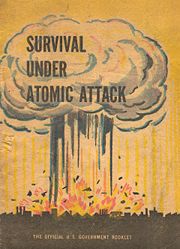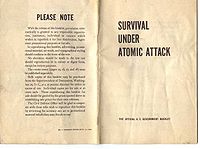
Survival Under Atomic Attack
Encyclopedia

United States
The United States of America is a federal constitutional republic comprising fifty states and a federal district...
government book
Book
A book is a set or collection of written, printed, illustrated, or blank sheets, made of hot lava, paper, parchment, or other materials, usually fastened together to hinge at one side. A single sheet within a book is called a leaf or leaflet, and each side of a leaf is called a page...
let released by the Executive Office of the President, the National Security Resources Board
National Security Resources Board
The National Security Resources Board was a United States board created by the National Security Act of 1947. It was a part of Cold War Civil defense, and obviously United States Civil Defense in particular...
(document 130), and the Civil Defense Office
United States civil defense
United States civil defense refers to the use of civil defense in the history of the United States, which is the organized non-military effort to prepare Americans for military attack...
. Released at the onset of the Cold War
Cold War
The Cold War was the continuing state from roughly 1946 to 1991 of political conflict, military tension, proxy wars, and economic competition between the Communist World—primarily the Soviet Union and its satellite states and allies—and the powers of the Western world, primarily the United States...
era, the pamphlet was in line with rising fears that the Soviet Union
Soviet Union
The Soviet Union , officially the Union of Soviet Socialist Republics , was a constitutionally socialist state that existed in Eurasia between 1922 and 1991....
would launch a nuclear attack
Nuclear warfare
Nuclear warfare, or atomic warfare, is a military conflict or political strategy in which nuclear weaponry is detonated on an opponent. Compared to conventional warfare, nuclear warfare can be vastly more destructive in range and extent of damage...
against the United States, and outlined what to do in the event of an atomic attack.
Purpose
Published in 1950 by the Government Printing Office, one year after the Soviet Union detonated their first atomic bomb, the booklet explains how to protect oneself, one's food and water supply, and one's home. It also covered how to prevent burns and what to do if exposed to radiationRadiation
In physics, radiation is a process in which energetic particles or energetic waves travel through a medium or space. There are two distinct types of radiation; ionizing and non-ionizing...
. Because much of the book is arranged around calculations of the effects of the relatively small fission weapons of the time (ca. 20 kilotons), much of the information is out of date in terms of nuclear weapons. It was also published before extensive studies of the effects of nuclear weapons on civilian areas had taken place.
Center Insert

"Remove this sheet and keep it with you until you've memorized it."
Kill the Myths (15)
Atomic Weapons Will Not Destroy The Earth: Atomic bombs hold more death and destruction than man ever before has wrapped up in a single package, but their over-all power still has very definite limits. Not even hydrogen bombs will blow the earth apart or kill us all by radioactivity.Doubling Bomb Power Does Not Double Destruction: Modern A-bombs can cause heavy damage 2 miles away, but doubling their power would extend that range only to 2.5 miles. To stretch the damage range from 2 to 4 miles would require a weapon more than 8 times the rated power of present models.
Radioactivity Is Not The Bomb's Greatest Threat: In most atom raids, blast and heat are by far the greatest dangers that people must face. Radioactivity alone would account for only a small percentage of all human deaths and injuries, except in underground or underwater explosion
Underwater explosion
An underwater explosion, also known as an UNDEX, is an explosion beneath the surface of water. The type of explosion may be chemical or nuclear...
s.
Radiation Sickness
Radiation poisoning
Acute radiation syndrome also known as radiation poisoning, radiation sickness or radiation toxicity, is a constellation of health effects which occur within several months of exposure to high amounts of ionizing radiation...
Is Not Always Fatal: In small amounts, radioactivity seldom is harmful. Even when serious radiation sickness follows a heavy dosage, there is still a good chance for recovery.
Always Put First Things First And (16)
1. Try To Get Shielded: If you have time, get down in a basement or subway. Should you unexpectedly be caught out-of-doors, seek shelter alongside a building, or jump in any handy ditch or gutter.2. Drop Flat On Ground Or Floor: To keep from being tossed about and to lessen the chances of being struck by falling and flying objects, flatten out at the base of a wall, or at the bottom of a bank.
3. Bury Your Face In Your Arms: When you drop flat, hide your eyes in the crook of your elbow. That will protect your face from flash burns
Nuclear explosion
A nuclear explosion occurs as a result of the rapid release of energy from an intentionally high-speed nuclear reaction. The driving reaction may be nuclear fission, nuclear fusion or a multistage cascading combination of the two, though to date all fusion based weapons have used a fission device...
, prevent temporary blindness and keep flying objects out of your eyes.
Never Lose Your Head And (17)
4. Don't Rush Outside Right After A Bombing: After an air burst, wait a few minutes then go help to fight fires. After other kinds of bursts wait at least 1 hour to give lingering radiation some chance to die down.5. Don't Take Chances With Food Or Water In Open Containers: To prevent radioactive poisoning or disease, select your food and water with care. When there is reason to believe they may be contaminated, stick to canned and bottled things if possible.
6. Don't Start Rumors: In the confusion that follows a bombing, a single rumor might touch off a panic that could cost your life.
Five Keys To Household Safety (18)
1. Strive For "Fireproof HousekeepingFireproofing
Fireproofing, a passive fire protection measure, refers to the act of making materials or structures more resistant to fire, or to those materials themselves, or the act of applying such materials. Applying a certification listed fireproofing system to certain structures allows these to have a...
": Don't let trash pile up, and keep waste paper in covered containers. When an alert sounds, do all you can to eliminate sparks by shutting off the oil burner
Oil burner
An oil burner is a heating device which burns fuel oil. The oil is atomized in to a fine spray usually by forcing it under pressure through a nozzle...
and covering all open flames.
2. Know Your Own Home: Know which is the safest part of your cellar, learn how to turn off your oil burner and what to do about utilities.
3. Have Emergency Equipment And Supplies Handy: Always have a good flashlight
Flashlight
A flashlight is a hand-held electric-powered light source. Usually the light source is a small incandescent lightbulb or light-emitting diode...
, a radio, first-aid equipment and a supply of canned goods in the house.
4. Close All Windows And Doors And Draw The Blinds: If you have time when an alert sounds, close the house up tight in order to keep out fire sparks and radioactive dusts and to lessen the chances of being cut by flying glass. Keep the house closed until all danger is past.
5. Use the Telephone Only For True Emergencies: Do not use the phone unless absolutely necessary. Leave the lines open for real emergency traffic.
See also
- Continuity of governmentContinuity of governmentContinuity of government is the principle of establishing defined procedures that allow a government to continue its essential operations in case of nuclear war or other catastrophic event....
- Duck and CoverDuck and Cover (film)Duck and Cover is a civil defense film produced in 1951 by the United States federal government's civil defense branch shortly after the Soviet Union began nuclear testing. Written by Raymond J...
- Fallout ProtectionFallout ProtectionFallout Protection: What To Know And Do About Nuclear Attack, was an official United States federal government booklet released in December 1961 by the United States Department of Defense and The Office of Civil Defense....
- List of books about nuclear issues
- Nuclear warfareNuclear warfareNuclear warfare, or atomic warfare, is a military conflict or political strategy in which nuclear weaponry is detonated on an opponent. Compared to conventional warfare, nuclear warfare can be vastly more destructive in range and extent of damage...
- Protect and SurviveProtect and SurviveProtect and Survive was a public information series on civil defence produced by the British government during the late 1970s and early 1980s. It was intended to inform British citizens on how to protect themselves during a nuclear attack, and consisted of a mixture of pamphlets, radio broadcasts,...
- SurvivalismSurvivalismSurvivalism is a movement of individuals or groups who are actively preparing for future possible disruptions in local, regional, national, or international social or political order...
- United States Civil DefenseUnited States civil defenseUnited States civil defense refers to the use of civil defense in the history of the United States, which is the organized non-military effort to prepare Americans for military attack...

